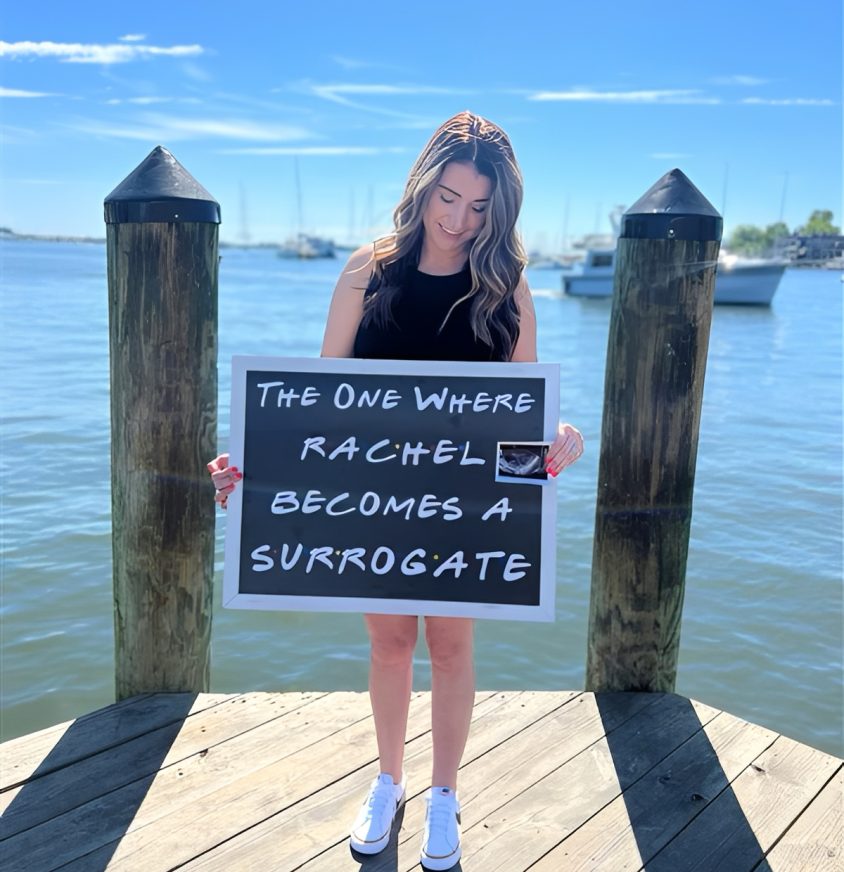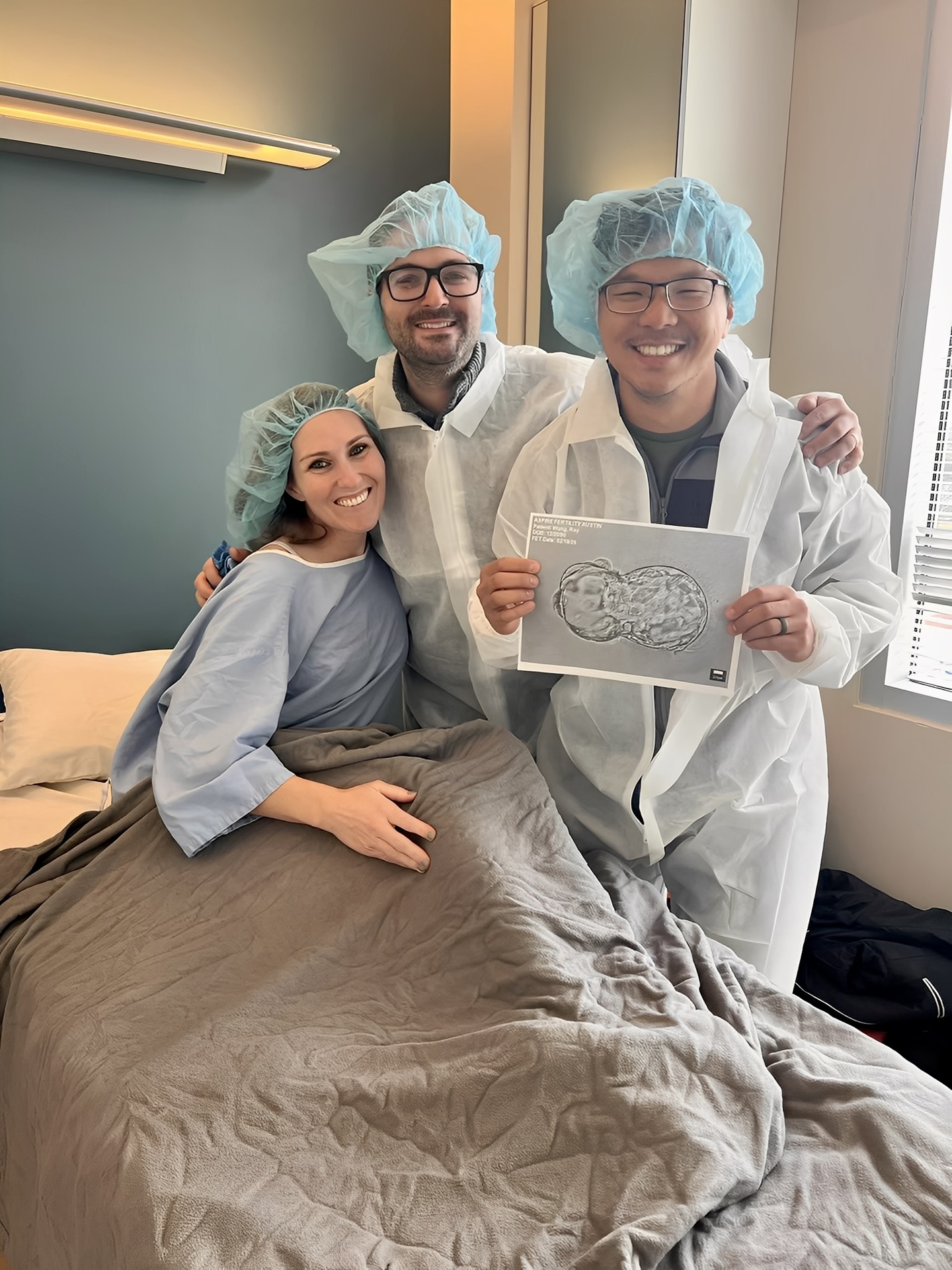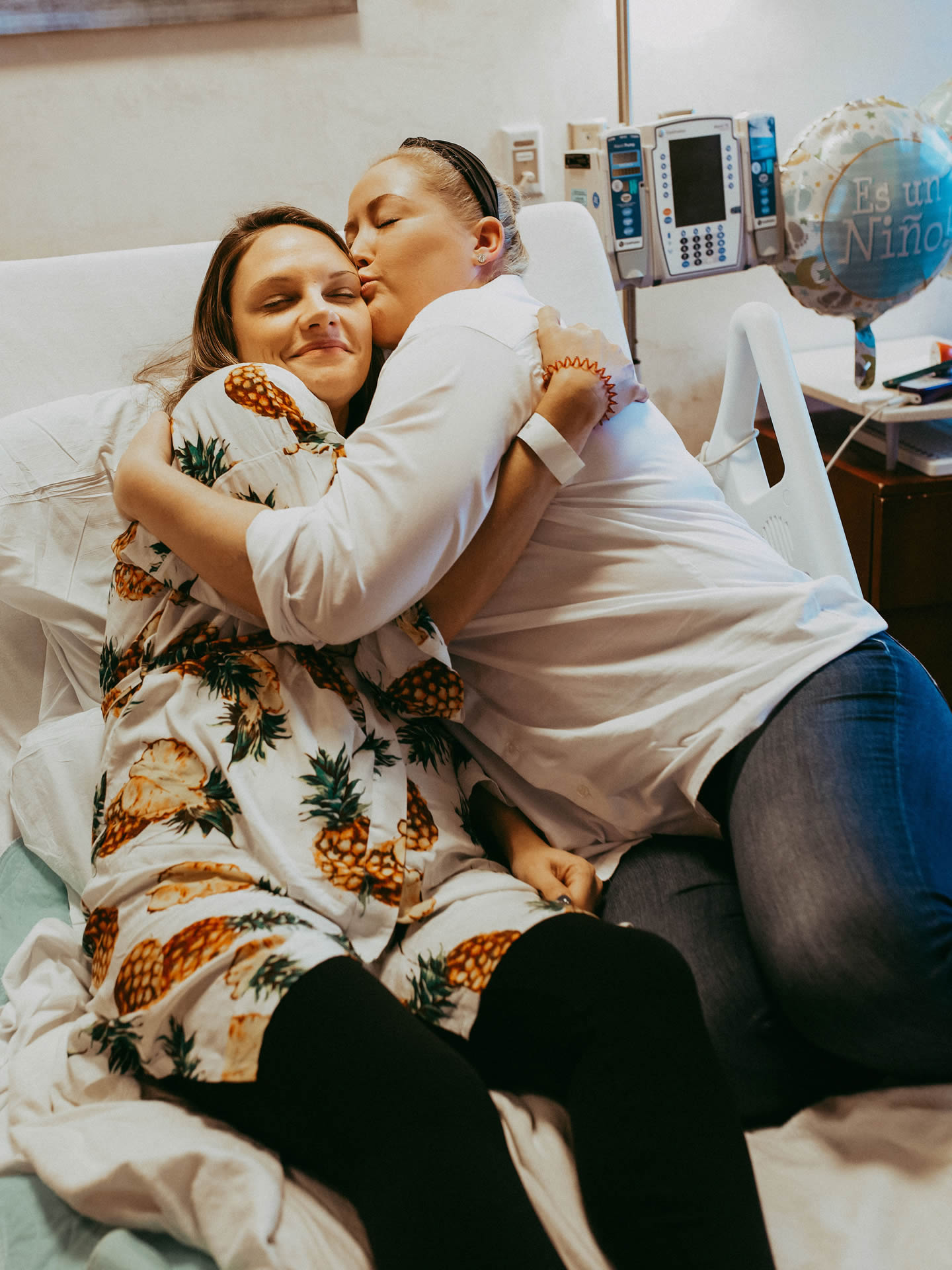Carrying a baby for someone else is an extraordinary act of love. We’re here to guide, support, and protect you every step of the way.

Surrogacy means carrying a baby for someone who dreams of becoming a parent. It’s an extraordinary act of love that brings hope to individuals and couples who are unable to carry a child on their own.
Our experienced team will guide you through every medical, emotional, and legal step with care for your safety, wellbeing, and peace of mind.
All of our Surrogates are women who are healthy, compassionate, and committed to helping others.
Are you between the ages of 21 and 40 years of age and generally healthy?
Are you raising at least one child that you have birthed?
Are you in overall good health? BMI must be 33 or below.
Are you financially independent and not receiving any state or federal government assistance?
Do you have a flexible schedule where you can commit to appointments?
Are you content with the number of children you have birthed and are raising?
Is it true that you have had no serious medical problems in pregnancy or delivery, including no pre-term births (before 36 weeks for a singleton or 35 weeks for twins)?
Becoming a Surrogate is a structured, supportive process designed to protect your health, honor your time, and ensure you feel supported.

Let’s get to know you! Tell us about your health and pregnancy history, family, and expectations for your surrogate journey.

We’ll also request a background check and some of your medical records.

Our team will send you profiles of families who match your expectations. You’ll then participate in a face-to-face match meeting with the family to share hopes and expectations.

Unlike other agencies, we help you choose a competitive base compensation that feels right for you. This can range upwards of $55,000 for first-time Surrogates and $65,000+ for those who have been a Surrogate before.
We prioritize your financial security and peace of mind. To ensure this, we provide a legally binding gestational agreement as well as partner with SeedTrust, a trusted third party escrow agency for payment security, timely payouts, and comprehensive medical bill coverage. Learn more about SeedTrust here.
Want a full breakdown of compensation? Check out this sample Surrogate Compensation Worksheet.
Our team includes former Donors, Surrogates, and parents who’ve experienced this process firsthand. We combine that personal insight with professional expertise to guide you with genuine understanding.

You set your compensation and choose the family you want to help.
Personalized care from your first call to post-delivery recovery.
Transparent compensation and benefits with no hidden costs.
Join a supportive network of people who share your purpose.
We work with every kind of Surrogate and every kind of intended parent. This means your decisions around vaccines, termination (or no termination) and the types of families you serve will always be honored. No pressure. Guaranteed.
From your first call to your final appointment, our experienced team, made up of former donors, surrogates, nurses, and coordinators, is here to guide and care for you every step of the way. We handle logistics, travel, and clinic communication so you can stay focused on what matters most: your wellbeing.
Our medical partners monitor each stage closely to ensure you remain safe, informed, and fully supported throughout your journey.
You focus on your health and the health of the baby.
We’ll take care of the rest.

From the moment I applied through the “4th trimester”, the entire team at ED & SS has been so helpful, inspiring, and motivating. I would recommend ED & SS to anyone who is considering being a surrogate.
Working with Egg Donor & Surrogate Solutions was one of the best decisions we ever made. We had the privilege of partnering with them for two surrogacy experiences, and thanks to their incredible team, we now have two beautiful children
Being an egg donor with Egg Donor & Surrogate Solutions turned out to be one of the best decisions I’ve ever made. Everyone I dealt with was kind, informative, and they were there for all of my needs. The whole process was explained thoroughly, and it all moved along smoothly. I would highly recommend using this agency. I am so lucky to have been able to be part of their program.
(Egg Donor & Surrogate Solutions) were with me every step of the way, and all their team is incredibly knowledgeable and friendly, and they truly care about you and helping create the happy family you’re dreaming of.
One thing this agency did that really stands out is their matching process. They matched us with a surrogate that shared the same sense of humor, beliefs, and she will be a friend to our family for life. We have two beautiful kids thanks to Surrogate Solutions, and we cannot thank them enough!
A gestational carrier would not be “giving the baby up”. She’d be giving the baby back to the parents that had chosen her to carry for them! There is no genetic connection between a gestational carrier and the surrogate baby(ies) she carries. Sometimes people aren’t aware of this fact, but it definitely helps the carrier and her family to mentally prepare before and during the pregnancy. The carrier is preparing to hand the parents their baby back, and she fully understands that the baby was never hers, to begin with.
Most Surrogates are matched with Intended Parents of their choice within a week of being cleared since we have so many Intended Parents already waiting. It may take several weeks to complete the clearance process because we need to obtain all of your prenatal and delivery records, a recent pap smear, and a clearance letter from your OBGYN. You will then meet with the matching team to discuss your preferences and you will be able to view compatible Intended Parent profiles for you to choose from.
The medications to become pregnant as a gestational carrier can vary depending on the clinic’s protocol. Some clinics require patients to give themselves injectable medications while others may not require any injectables at all. It is always best to prepare yourself for the possibility of having to administer shots at home, but this is something you may or may not have to do.
You do not get a paycheck since surrogacy is not a job, but you are compensated for the time and effort during the process. The compensation amount can vary from contract to contract. This is a private agreement between the Intended Parents and their carrier. The agreed-upon compensation is not guaranteed since the achievement of pregnancy is never guaranteed, but once you are pregnant, monthly installments are paid over the course of the pregnancy. There could be many factors such as unsuccessful embryo transfers or miscarriage that could cause compensation to never start or even halt.
Base compensation starts at $55,000 for a first-time carrier and $65,000 for repeat carriers (plus additional benefits that can total up to $95,000. With Egg Donor & Surrogate Solutions, you can set your compensation, so click here to schedule a quick time with your team so we can explore this together.
Ultimately, only YOU know what this journey is worth to you and you will choose compensation that feels right to you.
Yes! Surrogacy is the mutual agreement between the carrier and the Intended Parents. You will likely read about each other in your profiles well before ever meeting in person or over video conference. In the beginning, you may feel like acquaintances that met through an agency, but by the end of the pregnancy, you will likely know each other very well based on how much involvement was had during the process. There are some Intended Parents that find it very hard to develop a personal relationship with their carrier due to previous heartaches and losses. Each match is unique in this respect. The level of involvement that each party is expecting of the other is another topic that is usually agreed upon before you are ever considered a true match.
You are allowed to eat and participate in normal low-risk activities as you usually would during any normal, healthy pregnancy per your OBs guidelines. Unless there is a specific agreement between the carrier and her Intended Parents to avoid certain items, she may carry on per her doctor’s recommendations. Obviously, the usual substances like nicotine, alcohol, and drugs are NEVER allowed. There could be specific food requests based on religion or lifestyle preferences that Intended Parents may request of their Surrogate prior to matching. These specifics are usually brought up on applications and during the match meeting so there are no surprises later. If either party were to not feel sure about the requests, it would need to be discussed before a definite match was determined.
For the most part, the Surrogate has a very large say in the pregnancy. The Surrogate and Intended Parents should be in agreement with each other over factors like home birth vs hospital, vaccinations during the pregnancy vs no vaccinations, and having optional testing done throughout the pregnancy. Both parties should always go into surrogacy with a great deal of trust and respect for one another. Everyone should always strive to make major decisions together.
You will get to pick your own OB for prenatal care and delivery as long as they are a qualified medical provider. You do have to go to the IP’s IVF doctor until you are released to your OB for care, which is usually around 10 weeks of pregnancy. If their doctor is not local, you will only have to travel to them twice, for the medical screening and again for the embryo transfer, but you will be able to do monitoring appointments at a clinic local to you.
It depends on which Intended Parents you choose. If you match with a local couple, you won’t need to travel. If they are not local, you will need to travel to wherever their IVF clinic is 2-3 times. This depends on what each clinic requires of their patients. Usually, the first trip is for medical screening and the second one for embryo transfer. There could be an additional trip for a mock transfer or ERA, but this is not routine for all clinics. Long-distance travel is kept to a minimum whenever possible, and all costs are paid by the Intended Parents.
Absolutely! It is not a requirement to be married in order to become a gestational carrier. There are numerous single mothers that pursue surrogacy without a spouse or significant other. If you have a good support system in place, you can be a Surrogate!
Your significant other needs to be on board and supportive of you pursuing this journey. They will be required to participate in the match meeting with Intended Parents and show their support. During the screening process, clinics require the surrogate’s partner to undergo a blood test to ensure they are STD free, and they will participate in the psychological evaluation. During the legal contracts, if you are a married couple, both parties must sign the contract. Your significant other is usually the biggest part of your support system during pregnancy. Their involvement in the process is small overall, but very key to a healthy and happy journey.
The best advice we can give is to keep it sweet and simple. Children tend to understand better when you put it into terms they understand. There are several children’s books to explain that this is a way to help a Mommy or Daddy that cannot have a baby on their own. Children of surrogates have the perfect life example of what it’s like to do something selfless for someone else. It’s a great teaching opportunity if you choose to do so. How much you want to explain to your children is your personal choice, but sometimes your children can be your biggest cheerleaders!
You have a team designed to help YOU! As an agency, we are here to support, advocate, and educate you on the process of being a Surrogate. We are here to ensure all your questions are asked, you are cared for, to advocate / mediate if needed, and just to be an extra person to help you navigate this exciting experience. ALL of our team members have been Surrogates themselves so we understand your feelings and are committed to supporting you.
1. There are a few clinics that will still agree to transfer 2 embryos and there are the occasional Intended Parents that will request their Surrogate transfer 2 embryos. If you are only comfortable with carrying one baby, it is wise to only transfer one embryo. Occasionally an embryo can split resulting in twins, but that cannot be predicted. Being sure of how many babies you are willing to carry can greatly minimize the need for fetal reduction or termination that sometimes can occur with multiples pregnancies.
This question is a challenging question to answer. A Surrogate is usually allowed to walk away from a match at any point in the process as long there is no viable pregnancy. The decision to break a match should never be made lightly, same as the decision to make a match. Worst case scenario, if the Surrogate is already pregnant and feels the match is irreparable, she cannot break the match but can resort to using the agency coordinator (or another mediator such as her attorney or similar entity) to communicate for the remainder of the pregnancy.
We believe you deserve the utmost care at every step of your journey—from choosing the right match all the way through your postpartum care. Your 4th trimester is the first 12 weeks after delivery. It’s a crucial time of focusing on your physical healing, emotional wellness, and building new rhythms post-delivery.
Our agency uniquely supports Surrogates during their 4th trimester through a specialized health & fitness program hosted by Jenn and Ash Wellness, designed specifically for post-birth recovery, strength, and self-care. Wellness is about honoring the incredible work your body has done and continuing to care for it with love. It’s the best gift you can give yourself after giving the gift of life.
We also offer a 4th trimester support group led by approved psychologists who specialize in third-party reproductive health.
Every journey is a little different, but most surrogacy journeys follow a similar overall timeline. At our agency, Surrogates get matched very quickly with little waiting. From there, it often takes a few months to get through medical screening and legal contracts. Assuming all goes well with embryo transfer and a healthy pregnancy, most journeys will be somewhere between 18 and 24 months.
Regardless of how long or short your journey, we’ll guide you through every step and keep you informed so you always know what’s coming next.
Yes. You are always in control of your journey and who you choose.
We have a large and diverse database of hopeful families, and you’ll see several profiles that match your criteria. When you choose a family, you will have the opportunity to participate in a match meeting before deciding whether the match feels right for you.
A match only moves forward when you, the intended parents and their doctor feel confident and comfortable.
We work with Surrogates in most U.S. states, but surrogacy laws vary widely from state to state and occasionally change.
If you live in a state with restrictions or added legal complexity, we will talk through your options honestly and clearly before moving forward. Our priority is always to ensure your journey is legally protected and ethically sound.
If you are unsure whether your state qualifies, we encourage you to apply or reach out so we can review your specific situation.
That is completely okay.You are never required to hold beliefs or make decisions that conflict with your personal values.
During the matching process, we clearly discuss your comfort level with topics like selective reduction or termination. We then match you with intended parents whose views align with yours, so expectations are clear from the beginning. Mutual respect and alignment are essential to a healthy surrogacy relationship.
Yes. All surrogate compensation and reimbursements are handled through a third-party escrow company: SeedTrust Escrow
The escrow account is:
This protects everyone involved and ensures payments are made accurately, on time, and transparently.
You may choose your own attorney. We will provide a list from our trusted network of experienced reproductive law attorneys.
Regardless of which option you choose:
Our role is to make sure you feel supported, informed, and protected throughout the legal process.

Navigating how surrogate compensation works and the next steps in the process can be overwhelming. Get our free Surrogacy Journey & Compensation Guide so you understand it all. Help create a happy family—and receive $55,000+ in a base compensation—plus added benefits that can bring your total up to $95,000! At Egg Donor & Surrogate Solutions, YOU pick your compensation and YOU pick the family you help!

Surrogacy is more than medical. It’s deeply spiritual. And discerning a call to carry (or to let someone carry for you) isn’t always easy. Whether you’re pursuing surrogacy, preparing to carry for someone else, or just navigating unfamiliar terrain, you’re not alone. Called to Carry is a 14-day devotional for women of faith walking through the sacred, complex, and often hidden journey of surrogacy. Get your free copy today.